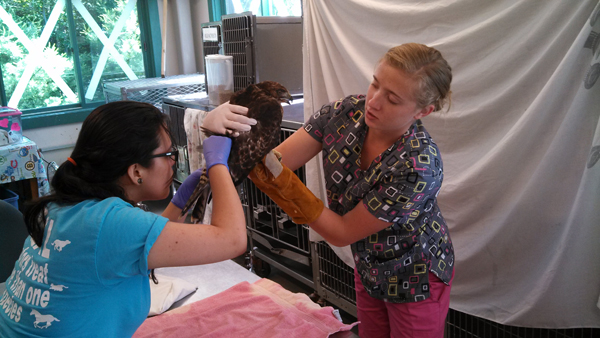
Scholarships Boost Student Interns
Kelley Glanz, a senior majoring in public service administration in agriculture, traveled to Scotland last summer to intern for Nourish Scotland, which seeks to make locally grown food more accessible.
Nicole Schubert, an animal ecology senior, spent the summer interning at the New England Wildlife Center in Massachusetts assisting with the medical treatment and rehabilitation of wildlife.
Elise Kendall, a junior in global resource systems, interned in Nepal, researching the impact of Machhapuchhre Development Organization’s organic farming education program.
Internships like these offer valuable experiences to students, but don’t always provide pay.
Very few of agricultural internships are unpaid, says Mike Gaul, director of career services for the College of Agriculture and Life Sciences.
“The good thing in agriculture is that typically 95 percent of internships are paid,” he says. “Internships in agriculture are just too competitive.”
He says the trend, especially in social sciences, is to offer unpaid internships. Also those that have international components, along with zoos, wildlife related facilities and veterinary clinics tend to be unpaid.
So he decided to offer 10 scholarships of $500 each. About 40 students applied.
Given the increased debt load associated with today’s college experience, these scholarships are designed to help cover some of the financial burden of potentially expensive internships, Gaul says.
“$500 may seem nominal, but it could cover airfare or a couple months rent,” he says.
Schubert said her internship at the wildlife center provided a variety of activities including many personal “firsts” like helping put on a cast, taking an X-ray by herself and putting an animal under anesthesia.
“This internship provided me with great hands-on experience and knowledge about the veterinary world I am excited to continue to build on in the future,” Schubert says.
Working for Nourish Scotland exposed Glanz to new concepts about that country’s agriculture and how its policies affected the industry. But it also helped her understanding of American agriculture.
“Overall, I enjoyed my experience at Nourish Scotland and came away with new perspectives to agricultural production and knowledge about our food system,” she says.
Kendall got to contact farmers in villages of Nepal’s mountainous regions during her internship. She researched the effectiveness of Machhapuchhre Development Organization’s programs to update organic farming methods.
It was an ideal introduction to what she hopes to be a career in international development.
“This will also help strengthen my application for the Peace Corps, which I hope to join after I graduate,” Kendall says.
The internship experiences available to students become more diverse and exciting every year, Gaul says.
“This is such a unique time in a student’s life and to have these experiences possibly diminished by lack of funding would truly be sad. The majority of these students are the ones we want representing Iowa State and serve to strengthen the college’s reputation throughout the world.”



